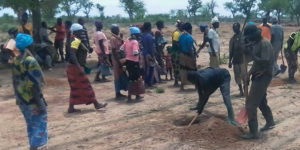Friars fund the St. Maximilian Kolbe Forest project to battle land erosion in Burkina Faso
by Gary Adornato
Burkino Faso, a West African nation within the Sahara Desert Proximity Zone, is facing a major environmental disaster. A lack of rain, combined with the worldwide emissions of carbon dioxide and the effects of global warming have begun to erode the land in the region, leaving behind heavy gullies of bare ground.
Answering the call to battle this problem are the Friars of the Order of Friars Minor Conventual, who have been serving in Burkina Faso since 2001, and the Franciscan Mission Association (FMA).
Planting trees in parched areas has proven to be an effective method of arresting soil erosion. The trees also serve as a windbreaker, allowing biodiversity to flourish in the habitat. To aid with this solution the Friars in Burkina Faso, who have friaries in Sabou and the capital city of Ouagadougou, have acquired 10 hectares (approximately 25 acres) of land where they have begun to plant trees as part of a project titled the St. Maximilian Kolbe Forest.
“We have begun with half a hectare,” said Fr. Joseph Kwame Blay, OFM Conv., the Order’s General Delegate for Justice, Peace and Integrity of Creation (JPIC). “This will take about 500 trees.”
The land that has been acquired is situated among shepherd communities where cattle is raised on free ranges. This creates a risk to the project as the cattle can eat up all of the young seedlings.
“We had to put a fence around the demarcated area for the pilot project,” said Fr. Blay. “We needed to bore a hole for water, to be able to water the trees during the dry season. We will monitor this takeoff project for three years before we extend it to cover the rest of the land.”

Local citizens lent their talents and labor to the tree planting project, helping reduce costs by clearing the land, digging holes, constructing fences and more.
The local community, which lives in a vicious cycle of poverty, has been involved in the project, providing as much communal labor as possible. Not only has this helped lower costs, but it has created a sense of ownership in the project for the local residents, who will benefit the most from its undertaking.
“When the trees are grown and form canopies, they will provide shade for people and cattle,” added Fr. Blay. “The excrement of the cattle organically fertilizes the land to enhance rapid growth of the trees. The fallen branches from the grown trees will provide firewood for household energy. Schools within the community can use the forest to teach pupils about the importance of trees and how to preserve them. Being a desert country, the afforested land will be a recreation park for people to come and see different species of trees.”
Without this project, the Sahara Desert would continue to expand in this area and the effects of global warming would continue to adversely impact Burkina Faso. The impact goes beyond the environment. Structural poverty forces many young people in the region to cross the Mediterranean in search of a better life. Unfortunately, many find themselves, instead, caught up in systemic slavery and even death.
The initial phase of this project cost more than $10,000 and was funded through the generous support of the FMA and its benefactors. The Friars, and the good people of Burkina Faso, are eternally grateful to all who have supported these efforts. These funds were used to clear the land, build barbed-wire fences, purchase the trees, dig trenches, hire a water drilling company to bore a water hole, and to pour reinforced concrete for sealing metal poles and wire mesh.
If you wish to support the FMA and Friars’ missionary work around the globe, you may make a donation to the Franciscan Mission Association. The FMA was founded in 1924 and supports the Friars missionary work all across the globe. Currently, the Order of Friars Minor Conventual serves in more than 60 countries, including Africa, Asia, Latin America and the former Soviet Union. Click here to reach the FMA donation page.
Pictured above: The barren, eroded soil in the West African nation of Burkino Faso is being transformed and protected from the harmful affects of global warming through the planting of hundreds of trees, which will eventually grow to thousands.

